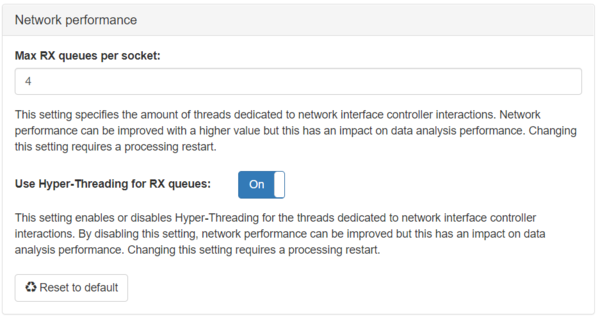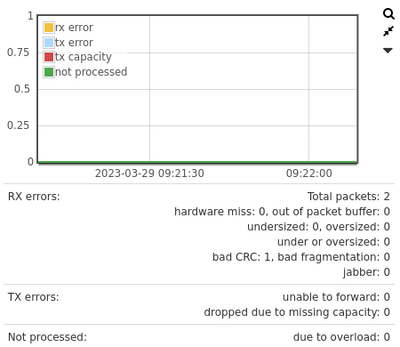Performance Optimization Guide: Difference between revisions
| Line 49: | Line 49: | ||
There are 3 scenarios where the a queue overload can happen, which are described in the following sections. | There are 3 scenarios where the a queue overload can happen, which are described in the following sections. | ||
=== | === Skipped packets at high analyzer load === | ||
The '''Allegro Network Multimeter''' has reached its processing limit for a current traffic when the load of one or multiple analyzers reaches 100%. | |||
There are a some options to reduce the analyzer load but it always comes with the penalty of no longer seeing the complete measurement data. You can '''disable''' some features or add a '''NIC filter''' to process only parts of the traffic. | |||
<ol> | |||
<li>You can reduce the level of analysis at '''Settings''' -> '''Global Settings'''.<br /> | |||
[[File:Detail of traffic analysis.png|600px]]<br /> | |||
Every level reduction will reduce the amount of analyzed data and saves database operations, see [[Global_settings#Limit_module_processing]] for more details of this option. It is possible to adjust the setting so that live traffic is stored as fast possible to the ring buffer without further analysis and re-analyze parts of the recorded traffic with full analysis by using the [[Parallel packet processing]].</li> | |||
<li>The NIC filter can be used to reduce the amount of monitored traffic. It excludes traffic from the analyzers for the cost of not-seeing all traffic of the link. See the [[Filter|interface filter]] for more details.</li> | |||
</ol> | |||
If no of these options are applicable, you need to upgrade the '''Allegro Network Multimeter''' to a larger model with more performance (Allegro 1000 to 3000 or 3000 to 5000). | |||
=== Overload at low analyzer load === | |||
This happens if the analyzers of the Allegro are in a powersafe mode and a very high and large burst of one connection arrives at the Allegro. This issue has happened at customer installations with 40G Links, an average saturation less than 5GBit/s and connection bursts above 10GBit/s. This can lead to minor packet drops as the wakeup of the analyzers is not fast enough. The solution is to use the [[#Sink Mode]] and to activate the '''Analyzer queue overcommit''' at '''Settings''' → '''Global settings''' → '''Expert settings'''. This mode allows to buffer network bursts. This mode is not available for the bridge mode. | |||
[[File: | [[File:Queue overcommit.png|600px]] | ||
=== Overload and not-balanced analyzer load === | === Overload and not-balanced analyzer load === | ||
Revision as of 14:01, 8 May 2020
About
This guide is about performance optimization of the Allegro Network Multimeter for specific use cases. By default, the device runs in a configuration that fits for the majority of users and you do not need to change any parameter of the configuration. Depending on the actual network traffic and measurement setup, it can be beneficial to adjust some performance-related parameters to achieve better overall performance.
High Level Allegro System Layout
The Allegro Network Multimeter has various components that processes the traffic. These components are:
- I/O threads: responsible for all I/O operations between the network interface cards and the CPUs.
- Analyzer threads: responsible for decoding network traffic and most of the database operations for the statistical values.
- DB threads: optional threads which offload memory intensive database operations, see DB mode.
The Allegro Network Multimeter uses queues to buffer packets and messages between the hardware instances (interfaces chips, central processing unit, storage) and threads. All threads measure their load individually which can be monitored at Info → System Info → Load.
The utilization of the following queues can be monitored to see if and where changes to queue settings are helpful:
Interface hardware queues
The interface hardware queue is between the network interfaces and the I/O threads of the central processing unit. Whenever the I/O threads are too slow to consume all packets from the built-in or extension network interfaces, the hardware miss counter of the Interface statistics will increase over time.
The load of the I/O threads can be checked at the Info → System Info → Load.
TODO: add overloaded Interface graph.
If the load is near 100%, packet miss can occur and the following countermeasures can be tried:
- The bridge mode requires approximately 10% - 30% more load on the I/O threads than the sink mode. The I/O threads have to sent the incoming traffic to the corresponding outgoing network interface for forwarding. If packet forwarding is not necessary (for example when being deployed at a mirror port), switching to sink mode will improve the performance of the device. For configuration, please see Global settings.
- The number of queues can be adjusted at the cost of analyzer threads. Each queue uses a corresponding CPU thread so more queues means less CPU threads available for other components. This option is available on the Allegro 3000 and above due to the large number of internal CPU cores. Allegro Packets recommends to increase the number of queues only on the Allegro 3000 and above if necessary.
- This setting can be changed at Settings -> Global Settings → Expert Settings

- Allegro Packets recommends to test with HT enabled and 2 or 4 queue for I/O. If you disable the load on the analyzers (see #High analyzer load), you can also test with 4 queues (I/O Threads) without HT for maximum performance.
Analyzer queues
The Allegro Network Multimeter has a packet queue between I/O threads and the analyzer threads which distributes the incoming packets to the actual processing threads. There are two statistics describing the load of the queues and analyzer threads. If analyzer threads cannot process incoming packets fast enough, the corresponding queue will eventually overflow and packets must be skipped for processing.
- Graphs for skipped packets: You can check at the Interface stats per interface and check whether all I/O threads were able to push all packets to the analyzer queues or not. The corresponding counter is Not processed due to overload.

Please note that high counters for a few seconds at the initial startup of the device are normal when it is started under high network load scenarios. - Utilization of individual analyzer threads: The load of the analyzer threads can be checked at the Info → System Info → Load. Depending of your Allegro model, there can be two (Allegro 200, Allegro 500) or up to 120 (Allegro 5300 or 5500) analyzer threads. The load graph gives an indication about the overall utilization of each thread but the important counter is the Not processed due to overload counter since this is the event when ultimately one or more packets could not be processed due to overload.
There are 3 scenarios where the a queue overload can happen, which are described in the following sections.
Skipped packets at high analyzer load
The Allegro Network Multimeter has reached its processing limit for a current traffic when the load of one or multiple analyzers reaches 100%.
There are a some options to reduce the analyzer load but it always comes with the penalty of no longer seeing the complete measurement data. You can disable some features or add a NIC filter to process only parts of the traffic.
- You can reduce the level of analysis at Settings -> Global Settings.

Every level reduction will reduce the amount of analyzed data and saves database operations, see Global_settings#Limit_module_processing for more details of this option. It is possible to adjust the setting so that live traffic is stored as fast possible to the ring buffer without further analysis and re-analyze parts of the recorded traffic with full analysis by using the Parallel packet processing. - The NIC filter can be used to reduce the amount of monitored traffic. It excludes traffic from the analyzers for the cost of not-seeing all traffic of the link. See the interface filter for more details.
If no of these options are applicable, you need to upgrade the Allegro Network Multimeter to a larger model with more performance (Allegro 1000 to 3000 or 3000 to 5000).
Overload at low analyzer load
This happens if the analyzers of the Allegro are in a powersafe mode and a very high and large burst of one connection arrives at the Allegro. This issue has happened at customer installations with 40G Links, an average saturation less than 5GBit/s and connection bursts above 10GBit/s. This can lead to minor packet drops as the wakeup of the analyzers is not fast enough. The solution is to use the #Sink Mode and to activate the Analyzer queue overcommit at Settings → Global settings → Expert settings. This mode allows to buffer network bursts. This mode is not available for the bridge mode.
Overload and not-balanced analyzer load
By default, the Allegro load balances the traffic between the analyzers based on the IP addresses of the client and server IP. This provides a very good balancing in most situations. The load distribution could be not balanced if there are many connections and load between 2 IP addresses. An example are 2 SIP trunks with many RTP connections. The statistics will show a part of the analyzers with a constant high load and others with a significant lower load.
The load balancing behavior of the Allegro can be changed to flow load balancing mode at Settings -> Global Settings → Expert Settings.
This mode improves the performance only for unbalanced traffic. Please use it only if required as it has a negative performance impact on balanced traffic.
Database queues
The database mode is an extension for large Allegros with NUMA setups and it is disabled by default. This mode is only recommended for Allegro 3500 rev1 and Allegro 5500 rev1. It helps improving very high database loads ( millions of open connections and new connections ) over multiple cpus. See DB mode for more details.
If enabled, you can check if there are message drops between the analyzer threads and the DB threads in the load statistics.
Disk I/O queues
The analyzer have software queues for each disk or each disk cluster. Storage devices like HDDs and SSDs do not offer a constant write rates and have sudden write slowdowns. Please read the performance guide for the ring buffer Ring_Buffer_Configuration_Guide#Performance.
The 2 generic solutions are to increase the buffer and to use filter rules. Both will reduce the load of bytes that are written to the disk.

